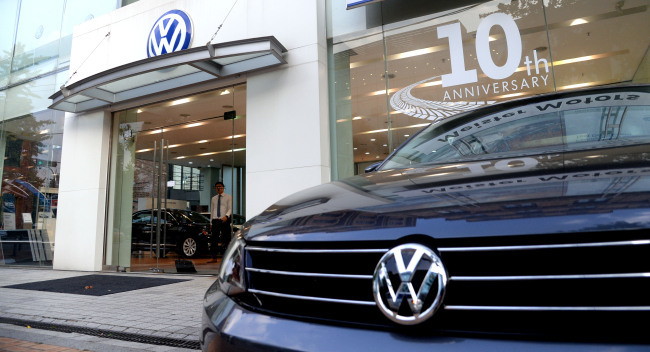Inside a sprawling three-story Volkswagen showroom in the affluent Gangnam area of Seoul, just two cars - the CC 2.0 TSI and Touareg - were on display.
These are the only two cars that were permitted to be sold here following a government sales ban and decertification move that affected a wide array of Volkswagen cars.
“We hardly have visitors these days,” one salesman at the dealership said, declining to be identified. “For now, these are the only cars we can sell,” he said, pointing to the two white cars. “It’s a government’s order, so what can we do?”
On Aug. 2, the Environment Ministry revoked the certification of 80 models of Audi, Volkswagen and Bentley vehicles for cheating on emissions and noise level tests. The ministry also banned them from being sold here.
The government’s decision has cost the German carmaker a significant market share, as well as a fine of 17.8 billion won ($16.02 million). In July alone, VW’s sales in South Korea tumbled by 85.8 percent from a year earlier, data from the Korea Automobile Importers and Distributors Association showed.
The frustration could be felt deeper among VW’s local dealers, who have to bear the burden of sales loss. Some -- on the brink of losing their main source of income -- are even considering leaving the embattled brand for good.
“To be honest, it’s really frustrating,” another dealer said. “We are trying, but it’s a difficult time to sell cars. I am not quite sure what will happen with us.”
The dealers said they haven’t heard anything from Audi Volkswagen Korea, the Korean unit of the automaker, on any supportive measures or compensation for the loss incurred due to the scandal.
According to industry sources, many dealers have already packed up and left. And a further exodus is inevitable if the company cannot come up with adequate countermeasures.
Audi Volkswagen Korea has said it would seek recertification as soon as possible, but the process is expected to take more than the usual three months, as the ministry made it clear that it will conduct thorough tests for the models in the question -- to the extent of visiting the carmaker’s German headquarters. During this hiatus, the dealers -- whose earnings are mostly made up of sales commissions -- will have no income.
“Audi Volkswagen Korea would not necessarily leave the Korean market, but for dealers, they will have to go hungry,” said Kim Pil-soo, an automotive engineering professor at Daelim University. “If this state continues, the dealers will decide to leave the brand, which would lead to a downsizing in showrooms and service centers.”
One of the main VW showrooms in Apgujeong-dong, southern Seoul, already closed down in July after 11 years of operation. It was managed by VW’s largest dealer here, Klasse Auto -- which in 2015 had made headlines by selling a whopping 1,000 units a month from its then eight showrooms across Seoul.
Audi, the VW Group’s luxury brand, was also hit by the latest emission predicament.
The sales of Audi in July decreased by 42.5 percent on-year, according to data by KAIDA.
Audi’s posh showroom in Cheongdam-dong -- a glitzy district housing high-end boutiques and luxury car showrooms -- was also empty on the day after the ministry’s punitive measure went into force.
The brand’s popular A6 and A4 diesel models no longer occupied the main stage of the showroom, ever since the ministry suspended sales of 42 models by the carmaker.
“There are barely any customers since the scandal made headlines,” an Audi salesperson said. “Maybe after two or three months, we might be able to resume sales, but at this point, we are not so confident.”
Dealers handling used cars were also becoming anxious.
“No one wants Volkswagen cars anymore,” said Oh Tae-shik, a used-car dealer. “Prices have fallen significantly and no one wants to buy or even sell these cars.”
According SK Encar, the nation’s largest used-car sales operator, the average price of used VW cars has dropped 11.9 percent since October, a month after the emission scandal broke globally. Prices are expected to dive even further since the sales ban, analysts say.
Recently, Klasse Auto also halted its used-car business of VW cars, hit by the sales slump.
“The price of used cars (of VW) is already down and some cars are not for transaction,” Kim said. “Since the government is not protecting against the loss, the damage is shared between dealers and customers.”
Meanwhile, Tomas Kuehl, CEO of Volkswagen Korea, told the local dealers in July that the company would do everything to mitigate the losses. He made it clear the company does not intend to abandon the Korean market.
Audi Volkswagen Korea, however, has yet to disclose definite plans to either its dealers or customers.
By Ahn Sung-mi / The Investor (
sahn@heraldcorp.com)





![[Today’s K-pop] Blackpink’s Jennie, Lisa invited to Coachella as solo acts](http://res.heraldm.com/phpwas/restmb_idxmake.php?idx=644&simg=/content/image/2024/11/21/20241121050099_0.jpg)


